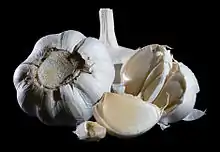大蒜
Chinese
big; great; huge big; great; huge; large; major; wide; deep; oldest; eldest; doctor |
garlic | ||
|---|---|---|---|
| trad. (大蒜) | 大 | 蒜 | |
| simp. #(大蒜) | 大 | 蒜 | |
Pronunciation
Derived terms
|
|
Descendants
Japanese
Etymology 1
| Kanji in this term | |
|---|---|
| 大 | 蒜 |
| にんにく | |
| Grade: 1 | Hyōgaiji |
| irregular | |
| For pronunciation and definitions of 大蒜 – see the following entry. | ||
| ||
| (This term, 大蒜, is an alternative spelling of the above term.) |
Pronunciation
- IPA(key): [o̞ːbʲiɾɯ̟ᵝ]
This article is issued from Wiktionary. The text is licensed under Creative Commons - Attribution - Sharealike. Additional terms may apply for the media files.
